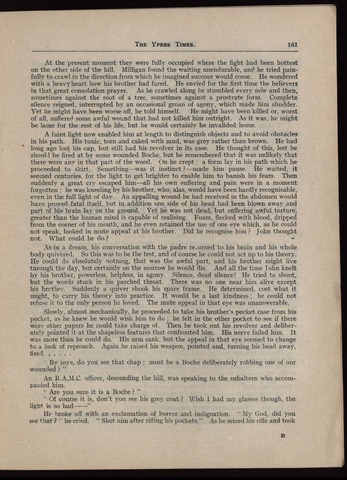The Ypres Times.
161
At the present moment they were fully occupied where the fight had been hottest
on the other side of the hill. Milligan found the waiting unendurable, and he tried pain
fully to crawl in the direction from which he imagined succour would come. He wondered
with a heavy heart how his brother had fared. He envied for the first time the believers
in that great consolation prayer. As he crawled along he stumbled every now and then,
sometimes against the root of a tree, sometimes against a prostrate form. Complete
silence reigned, interrupted by an occasional groan of agony, which made him shudder.
Yet he might have been worse off, he told himself. He might have been killed or, worst
of all, suffered some awful wound that had not killed him outright. As it was, he might
be lame for the rest of his life, but he would certainly be invalided home.
A faint light now enabled him at length to distinguish objects and to avoid obstacles
in his path. His tunic, torn and caked with mud, was grey rather than brown. He had
long ago lost his cap, but still had his revolver in its case. He thought of this, lest he
should be fired at by some wounded Boche, but he remembered that it was unlikely that
there were any in that part of the wood. On he crept a form lay in his path which he
proceeded to skirt. Somethingwas it instinct made him pause. He waited, it
seemed centuries, for the light to get brighter to enable him to banish his fears. Then
suddenly a great cry escaped himall his own suffering and pain were in a moment
forgotten he was kneeling by his brother, who, alas, would have been hardly recognisable,
even in the full light of day. An appalling wound he had received in the abdomen would
have proved fatal itself, but in addition one side of his head had been blown away and
part of his brain lay on the ground. Yet he was not dead, but suffering awful torture,
greater than the human mind is capable of realising. Foam, flecked with blood, dripped
from the corner of his mouth, and he even retained the use of one eye which, as he could
not speak, looked in mute appeal at his brother. Did he recognise him John thought
not. What could he do
As in a dream, his conversation with the padre returned to his brain and his whole
body quivered. So this was to be the test, and of course he could not act up to his theory.
He could do absolutely nothing, that was the awful part, and his brother might live
through the day, but certainly on the morrow he would die. And all the time John knelt
by his brother, powerless, helpless, in agony. .Silence, dead silence! He tried to shout,
but the words stuck in his parched throat. There was no one near him alive except
his brother. Suddenly a quiver shook his spare frame. He determined, cost what it
might, to carry his theory into practice. It would be a last kindness he could not
refuse it to the only person he loved. The mute appeal in that eye was unanswerable.
Slowly, almost mechanically, he proceeded to take his brother's pocket case from his
pocket, as he knew he would wish him to do he felt in the other pocket to see if there
were other papers he could take charge of. Then he took out his revolver and deliber
ately pointed it at the shapeless features that confronted him. His nerve failed him. It
was more than he could do. His arm sank, but the appeal in that eye seemed to change
to a look of reproach. Again he raised his weapon, pointed and, turning his head away,
fired
By jove, do you see that chap must be a Boche deliberately robbing one of our
wounded
An R.A.M.C. officer, descending the hill, was speaking to the subaltern who accom
panied him.
Are you sure it is a Boche
Of course it is, don't you see his grey coat Wish I had my glasses though, the
light is so bad
He broke off with an exclamation of horror and indignation. My God, did you
see that he cried. Shot nim after rifling his pockets." As he seized his rifle and took
D

